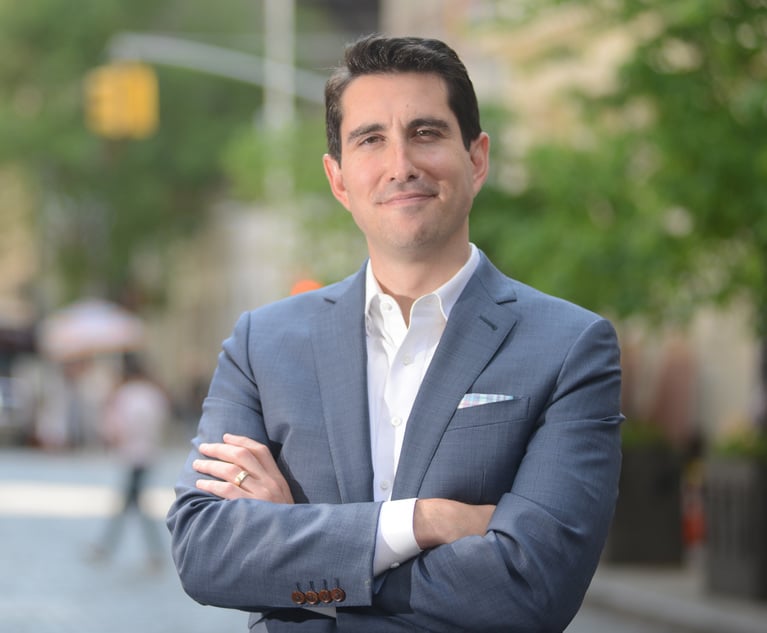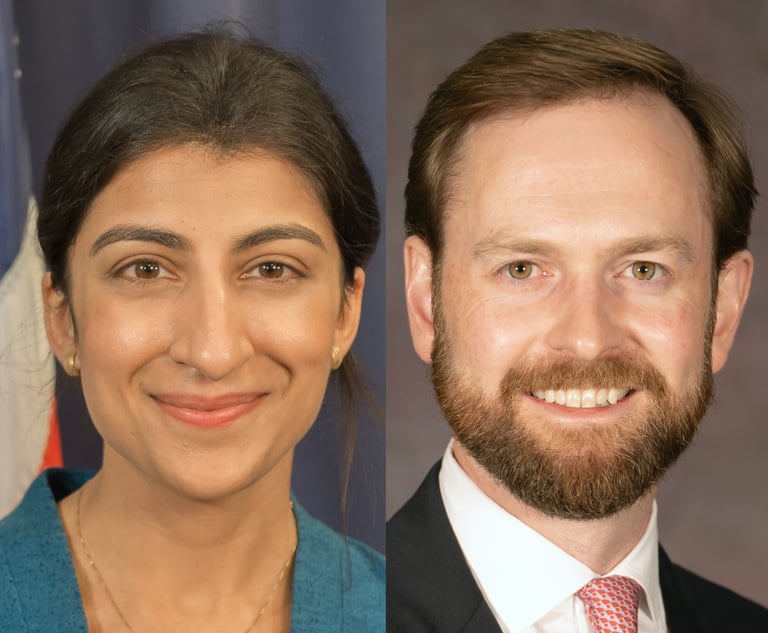Fla. Compounding Pharmacy Owner's Guilty Plea is Latest Example of Increased Fed Scrutiny
Nicholas Borgesano Jr., 45, of New Port Richey, Florida, pleaded guilty Monday in federal court in Tampa to conspiracy to commit health care fraud in connection with a $100 million scheme involving compounded prescription medications. More compounding pharmacies are finding themselves in the Justice Department's crosshairs.
November 08, 2017 at 02:39 PM
7 minute read
 Photo: Diego M. Radzinschi/ALM.
Photo: Diego M. Radzinschi/ALM. Amid the federal government's crackdown on compounding pharmacy abuse, the owner of a Florida pharmacy that prosecutors say was at the center of a $100 million scheme involving compounded prescription medications has pleaded guilty to conspiracy to commit health care fraud.
Nicholas Borgesano Jr., 45, of New Port Richey, Florida, also pleaded guilty Monday in Tampa federal court to conspiracy to engage in monetary transactions involving criminally derived property. A sentencing date before U.S. District Judge James Moody Jr. of the Middle District of Florida has not yet been scheduled.
Borgesano is represented by Page A. Pate of Pate & Johnson in Atlanta. An email to his office for comment was not immediately returned.
According to the U.S. Department of Justice, Borgesano and his alleged co-conspirators submitted false and fraudulent reimbursement claims for the compounded medications such as pain and scar creams to private insurance companies, as well as to Medicare and TRICARE, the medical program that provides health insurance to members of the military. Seven other defendants, all from Florida, have already pleaded guilty to conspiracy to commit health care fraud for their roles in the scheme, the DOJ said.
Compounding pharmacies mix individual ingredients to customize prescriptions in dosage and strength for individual patients, instead of dispensing manufactured medications. The market for compounded medications has been growing in recent years, according to pharmacy industry research. Compounding pharmacies also were targeted in recent years in a U.S. Food and Drug Administration crackdown after regulators found unsafe practices at some facilities during an investigation prompted by a deadly outbreak of meningitis traced to one such pharmacy in New England. A pharmacist in the New England facility was acquitted last month on murder charges in connection with patient deaths in 2012 from mold-contaminated drugs but convicted of mail fraud and racketeering.
Borgesano admitted that he and his co-conspirators manipulated billing codes in the reimbursement claims, and submitted claims for pharmaceutical ingredients they did not have, according to prosecutors. They also paid kickbacks and bribes in exchange for prescriptions and patient-identifying information, including to a physician who allegedly signed prescriptions for patients he never saw, the DOJ said.
The main hub of Borgesano's operation was his New Port Richey pharmacy, A to Z Pharmacy. But he also used other pharmacies he owned in his allegedly fraudulent scheme, including: Havana Pharmacy, Medplus/New Life Pharmacy and Metropolitan Pharmacy, all of Miami and Jaimy Pharmacy and Prestige Pharmacy, both of Hialeah, Florida.
The case is the latest in a government crackdown on compounding pharmacy abuse, due in large part to TRICARE's significantly higher reimbursement than other health insurers' reimbursements for compounded medications, said Nick Oberheiden, managing partner at Dallas-based Oberheiden & McMurrey.
From 2013-15, federal investigators uncovered about $2 billion—$500 million of it occurring in Florida—in fraudulent prescription compounding claims to TRICARE nationally, and civil settlements and criminal indictments followed.
In August, a St. Augustine, Florida, pharmacy owner pleaded guilty to health care fraud in connection with his role in a fraudulent compounding pharmacy scheme. And in 2015, four Florida pharmacies agreed to pay a combined $12.8 million to settle civil allegations that they bilked TRICARE for compounded creams and gels.
Last month, a Gulfport, Mississippi, physician was charged in a 16-count federal indictment for fraud against TRICARE for prescribing medically unnecessary compounds, some including ketamine, an anesthetic that is sometimes abused. He allegedly wrote prescriptions without examining patients and had the prescriptions filled by a Hattiesburg, Mississippi-based compounding pharmacy, according to a Justice Deptartment news release.
Given the increased scrutiny, Oberheiden said compounding pharmacies “need to be careful if that's your business plan. You may want to think twice.”
 Photo: Diego M. Radzinschi/ALM.
Photo: Diego M. Radzinschi/ALM. Amid the federal government's crackdown on compounding pharmacy abuse, the owner of a Florida pharmacy that prosecutors say was at the center of a $100 million scheme involving compounded prescription medications has pleaded guilty to conspiracy to commit health care fraud.
Nicholas Borgesano Jr., 45, of New Port Richey, Florida, also pleaded guilty Monday in Tampa federal court to conspiracy to engage in monetary transactions involving criminally derived property. A sentencing date before U.S. District Judge James Moody Jr. of the Middle District of Florida has not yet been scheduled.
Borgesano is represented by Page A. Pate of Pate & Johnson in Atlanta. An email to his office for comment was not immediately returned.
According to the U.S. Department of Justice, Borgesano and his alleged co-conspirators submitted false and fraudulent reimbursement claims for the compounded medications such as pain and scar creams to private insurance companies, as well as to Medicare and TRICARE, the medical program that provides health insurance to members of the military. Seven other defendants, all from Florida, have already pleaded guilty to conspiracy to commit health care fraud for their roles in the scheme, the DOJ said.
Compounding pharmacies mix individual ingredients to customize prescriptions in dosage and strength for individual patients, instead of dispensing manufactured medications. The market for compounded medications has been growing in recent years, according to pharmacy industry research. Compounding pharmacies also were targeted in recent years in a U.S. Food and Drug Administration crackdown after regulators found unsafe practices at some facilities during an investigation prompted by a deadly outbreak of meningitis traced to one such pharmacy in New England. A pharmacist in the New England facility was acquitted last month on murder charges in connection with patient deaths in 2012 from mold-contaminated drugs but convicted of mail fraud and racketeering.
Borgesano admitted that he and his co-conspirators manipulated billing codes in the reimbursement claims, and submitted claims for pharmaceutical ingredients they did not have, according to prosecutors. They also paid kickbacks and bribes in exchange for prescriptions and patient-identifying information, including to a physician who allegedly signed prescriptions for patients he never saw, the DOJ said.
The main hub of Borgesano's operation was his New Port Richey pharmacy, A to Z Pharmacy. But he also used other pharmacies he owned in his allegedly fraudulent scheme, including: Havana Pharmacy, Medplus/New Life Pharmacy and Metropolitan Pharmacy, all of Miami and Jaimy Pharmacy and Prestige Pharmacy, both of Hialeah, Florida.
The case is the latest in a government crackdown on compounding pharmacy abuse, due in large part to TRICARE's significantly higher reimbursement than other health insurers' reimbursements for compounded medications, said Nick Oberheiden, managing partner at Dallas-based Oberheiden & McMurrey.
From 2013-15, federal investigators uncovered about $2 billion—$500 million of it occurring in Florida—in fraudulent prescription compounding claims to TRICARE nationally, and civil settlements and criminal indictments followed.
In August, a St. Augustine, Florida, pharmacy owner pleaded guilty to health care fraud in connection with his role in a fraudulent compounding pharmacy scheme. And in 2015, four Florida pharmacies agreed to pay a combined $12.8 million to settle civil allegations that they bilked TRICARE for compounded creams and gels.
Last month, a Gulfport, Mississippi, physician was charged in a 16-count federal indictment for fraud against TRICARE for prescribing medically unnecessary compounds, some including ketamine, an anesthetic that is sometimes abused. He allegedly wrote prescriptions without examining patients and had the prescriptions filled by a Hattiesburg, Mississippi-based compounding pharmacy, according to a Justice Deptartment news release.
Given the increased scrutiny, Oberheiden said compounding pharmacies “need to be careful if that's your business plan. You may want to think twice.”
This content has been archived. It is available through our partners, LexisNexis® and Bloomberg Law.
To view this content, please continue to their sites.
Not a Lexis Subscriber?
Subscribe Now
Not a Bloomberg Law Subscriber?
Subscribe Now
NOT FOR REPRINT
© 2025 ALM Global, LLC, All Rights Reserved. Request academic re-use from www.copyright.com. All other uses, submit a request to [email protected]. For more information visit Asset & Logo Licensing.
You Might Like
View All
Survey Finds Majority of Legal Professionals Still Intimidated by AI Despite Need to Streamline Mounting Caseloads

Kraken’s Chief Legal Officer Exits, Eyes Role in Trump Administration
3 minute read
FTC Chair Lina Khan Sues John Deere Over 'Right to Repair,' Infuriates Successor
6 minute read
‘Facebook’s Descent Into Toxic Masculinity’ Prompts Stanford Professor to Drop Meta as Client
6 minute readTrending Stories
- 1Can a Law Firm Institutionalize Its Culture? Boies Schiller’s New Chairman Will Try
- 2Full 8th Circuit Hears First Amendment Challenge to School District’s ‘Equity Training’
- 3Exploring Generative AI’s Impact on Intellectual Property
- 4Training Lawyers in AI and Using AI to Boost Training
- 5EB-5 Rebounds After a Rocky Year: Challenges of 2024 Lay Groundwork for a Booming 2025
Who Got The Work
J. Brugh Lower of Gibbons has entered an appearance for industrial equipment supplier Devco Corporation in a pending trademark infringement lawsuit. The suit, accusing the defendant of selling knock-off Graco products, was filed Dec. 18 in New Jersey District Court by Rivkin Radler on behalf of Graco Inc. and Graco Minnesota. The case, assigned to U.S. District Judge Zahid N. Quraishi, is 3:24-cv-11294, Graco Inc. et al v. Devco Corporation.
Who Got The Work
Rebecca Maller-Stein and Kent A. Yalowitz of Arnold & Porter Kaye Scholer have entered their appearances for Hanaco Venture Capital and its executives, Lior Prosor and David Frankel, in a pending securities lawsuit. The action, filed on Dec. 24 in New York Southern District Court by Zell, Aron & Co. on behalf of Goldeneye Advisors, accuses the defendants of negligently and fraudulently managing the plaintiff's $1 million investment. The case, assigned to U.S. District Judge Vernon S. Broderick, is 1:24-cv-09918, Goldeneye Advisors, LLC v. Hanaco Venture Capital, Ltd. et al.
Who Got The Work
Attorneys from A&O Shearman has stepped in as defense counsel for Toronto-Dominion Bank and other defendants in a pending securities class action. The suit, filed Dec. 11 in New York Southern District Court by Bleichmar Fonti & Auld, accuses the defendants of concealing the bank's 'pervasive' deficiencies in regards to its compliance with the Bank Secrecy Act and the quality of its anti-money laundering controls. The case, assigned to U.S. District Judge Arun Subramanian, is 1:24-cv-09445, Gonzalez v. The Toronto-Dominion Bank et al.
Who Got The Work
Crown Castle International, a Pennsylvania company providing shared communications infrastructure, has turned to Luke D. Wolf of Gordon Rees Scully Mansukhani to fend off a pending breach-of-contract lawsuit. The court action, filed Nov. 25 in Michigan Eastern District Court by Hooper Hathaway PC on behalf of The Town Residences LLC, accuses Crown Castle of failing to transfer approximately $30,000 in utility payments from T-Mobile in breach of a roof-top lease and assignment agreement. The case, assigned to U.S. District Judge Susan K. Declercq, is 2:24-cv-13131, The Town Residences LLC v. T-Mobile US, Inc. et al.
Who Got The Work
Wilfred P. Coronato and Daniel M. Schwartz of McCarter & English have stepped in as defense counsel to Electrolux Home Products Inc. in a pending product liability lawsuit. The court action, filed Nov. 26 in New York Eastern District Court by Poulos Lopiccolo PC and Nagel Rice LLP on behalf of David Stern, alleges that the defendant's refrigerators’ drawers and shelving repeatedly break and fall apart within months after purchase. The case, assigned to U.S. District Judge Joan M. Azrack, is 2:24-cv-08204, Stern v. Electrolux Home Products, Inc.
Featured Firms
Law Offices of Gary Martin Hays & Associates, P.C.
(470) 294-1674
Law Offices of Mark E. Salomone
(857) 444-6468
Smith & Hassler
(713) 739-1250






